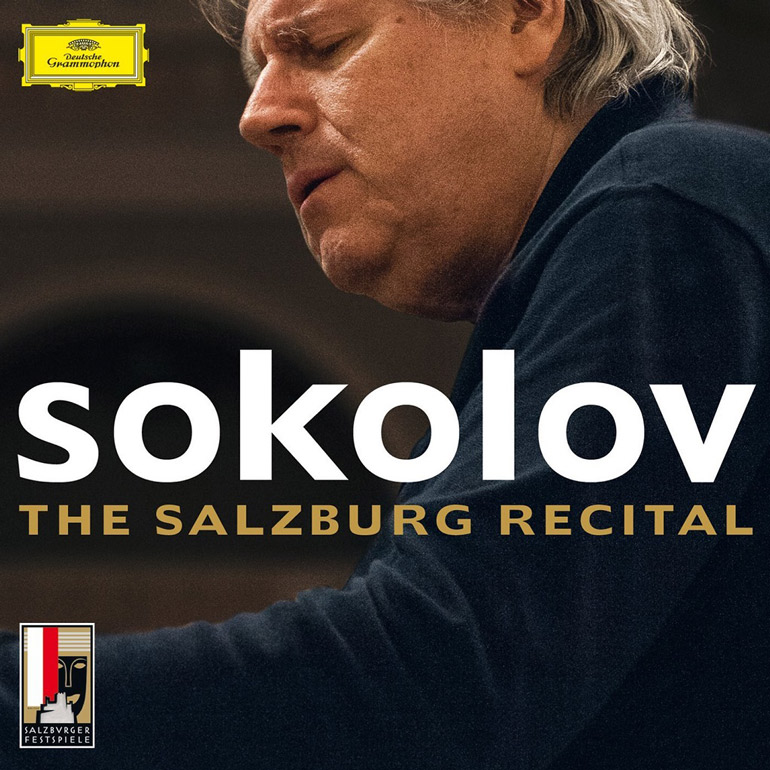
Grigory Sokolov, piano. Recorded live at the Salzburg Festival July 30, 2008. DG 479 4342 2 CDs (Total Time: 109:02)
[Available at Amazon.com and iTunes.]
In the mid-1950s, the concert world was practically turned on its ear when Soviet artists were finally allowed to tour in the West. One of the first to emerge was Emil Gilels. I heard him at Massey Hall in 1957 in a spectacular performance of Stravinsky’s Petrouchka. I had never heard piano playing like that in my life. I was in a daze for weeks after that trying to assimilate what I had heard. Then came Richter, Oistrakh, Kogan, Rostropovich and many others. It was incredible.
Grigory Sokolov was too young to be a part of that illustrious group – he was born in 1950 – but his story is just as remarkable. He won the Tchaikovsky Competition at the age of 16, the year Gilels was chairman of the jury. Instead of going on to conquer the world, Sokolov chose to spend most of his time in the Soviet Union. It could be that the choice was not entirely his to make; in any case, it was not until after the collapse of the Soviet Union in 1990, that Sokolov began to venture further afield. His reputation was further circumscribed by his aversion to making recordings; the several he did make for the Russian label Melodiya had limited distribution in the West.
Now comes Sokolov’s first recording for a major international label. One can only imagine what it took for the DG management to convince him to allow them to release this recital from the Salzburg Festival. At a time when recordings are being released within months of the live performances, it took seven years for this one to see the light of day. Whatever the reason, it was worth the wait. These are some of the finest piano recordings one could ever hope to hear.
The entire first half of the concert was devoted to Mozart sonatas. Although one doesn’t normally associate Mozart’s music with Russian musicians, one does recall Gilel’s great performances of several Mozart concertos with Böhm and the Vienna Philharmonic, but then, Gilels played nearly everything with incomparable musicianship. Sokolov plays Mozart with an incredible beauty of tone. Gilels comes to mind, and also Michelangeli, both pianists who, before they play a note, make sure that their chosen instrument is the best it can be, not only perfectly tuned and voiced, but also otherwise tweaked to make the most perfect sounds when played. Listening to Sokolov play, one cannot help but be astonished by the beauty of tone in every register from the deepest bass to the highest treble notes. The extreme range of Sokolov’s piano is not put to the test in Mozart but the sheer beauty of the sound is nonetheless breathtaking.
Then there is the clarity of articulation, which is a wonder to hear. The phrasing, though impeccably tasteful in “classical” style, is neither boring nor lacking in individuality, but rather, incredibly expressive.
The second half of the concert was far more challenging technically and in Chopin’s Préludes Op. 28, Sokolov gave an absolute master class in how these pieces should be played. He was dazzling in Nos. 3 and 5, and the chromatic intensity of his No. 8 was gripping. In No. 12, he conveyed the image of an enormous strutting horse, both majestic and frightening. In No. 15 in D flat major, the longest of the Preludes, he maintained a hypnotic sostenuto and the fortissimos, when they came, were full-throated without any sense of banging.
Sokolov’s sense of rubato in Chopin is almost unique. If one follows along with the score, one can see that he remains invariably faithful to the printed music while finding the poetry behind the notes.
Sokolov was unusually generous with encores at this Salzburg recital, and each of the six he played was a gem: two Poèmes Op. 69 by Scriabin, two Chopin Mazurkas, Les Sauvages by Rameau with the most fastidious ornamentation one could imagine, and finally a chorale prelude by Bach.
While he is now 65 and plays primarily in Europe, let’s hope that the success of this remarkable new recording will encourage Sokolov to make himself more readily available to a rapidly growing world of admirers.
#LUDWIGVAN
Want more updates on Toronto-centric classical music news and review before anyone else finds out? Get our exclusive newsletter here and follow us on Facebook for all the latest.
- SCRUTINY | TSO Lets Berlioz Do The Talking In Season Opener - September 21, 2018
- RECORD KEEPING | Even Yannick Nézet-Séguin Can’t Make Us Love Mozart’s La Clemenza di Tito - September 6, 2018
- RECORD KEEPING | Giovanna d’Arco With Anna Netrebko Explains Why The Best Operas Survive - August 30, 2018



